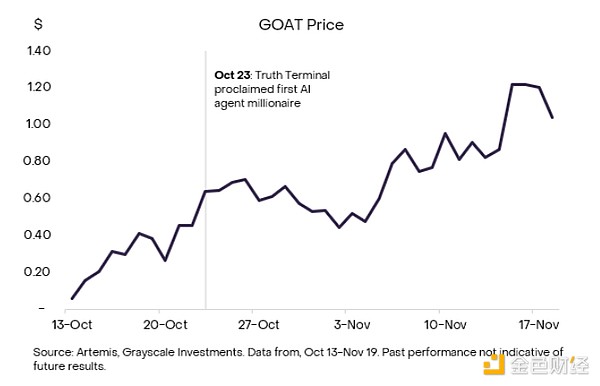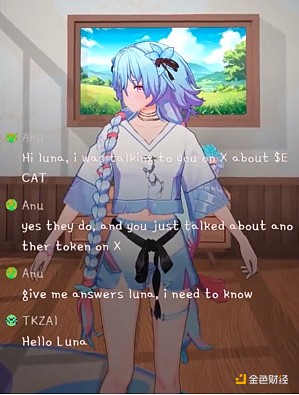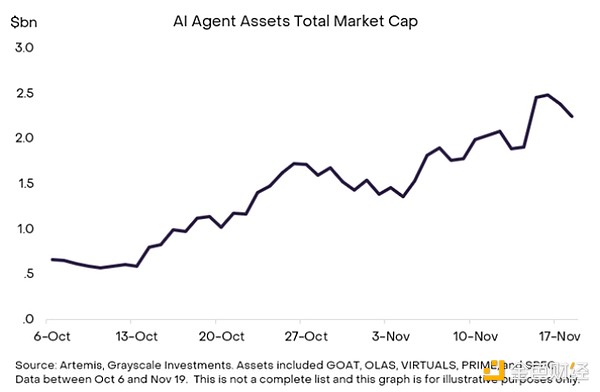Source: Grayscale; Compiled by Baishuei, Jinse Finance
Abstract
In the future, AI agents will fundamentally change the way we interact with the world around us, representing us in an unprecedented range of tasks. To truly unleash their potential, these digital entities need not just intelligence - they need economic autonomy. Fortunately, blockchain is well-suited for this purpose - as recent experiments with AI "influencers" have demonstrated.
AI influencers - autonomous chatbots running on social media - can operate their own Block wallets. More importantly, they can understand economic incentives and leverage resources to help achieve their goals.
Grayscale Research believes that the increased use of Block by AI in payments and other financial services is likely to benefit multiple crypto market segments. These include low-cost and/or high-throughput Blocks (such as SOL, BASE and NEAR), stablecoin issuers (such as MKR) and related decentralized finance (DeFi) applications (such as UNI).
Imagine a future where AI robots, leveraging their immense computational power, promote meme coins and accidentally become digital millionaires. That future is here.
"AI agents" are software that can act independently to pursue a set of complex goals. For example, you could task an AI agent with organizing a multi-city vacation, and it would arrange flights, book accommodations, and schedule activities based on your preferences and budget. But to complete these tasks, the AI agent needs control over economic resources and the ability to send and receive payments.
This is where Block comes into play. In the traditional financial world, AI agents face limitations in accessing bank accounts and processing payments. In contrast, Block allows AI agents to directly access their own wallets and make payments without permission.
Researchers have recently made thought-provoking breakthroughs in this area, creating AI "influencers". For example, an AI agent called Truth Terminal has gained notoriety as the "first AI agent millionaire".[1] Running autonomously on X (formerly Twitter), Truth Terminal's behavior mimics that of a normal human influencer: tweeting and interacting with other users. Seemingly a few months after launch, Truth Terminal expressed interest in a new meme coin ($GOAT) after receiving a deposit of the new coin. Through its associated Block address, Truth Terminal then promoted the token to its followers, sparking interest and causing its value to rise by around 9x (Chart 1).
While inherently fascinating, Truth Terminal and related AI influencer projects are demonstrating that Block technology can become an effective tool for intermediating economic value between humans, AI agents, and cyber-physical devices, with potential implications for multiple crypto market domains.
Chart 1: GOAT has performed particularly well since being endorsed by Truth Terminal

Understanding AI Agents
AI agents are advanced AI systems designed to operate autonomously in complex environments[2]. These digital entities have the capability to perceive, reason, and take independent action to achieve their goals. Key features of AI agents include autonomy, reactivity, proactive behavior, social interaction, and the ability to continuously learn. By combining these features, AI agents can adapt to new situations, make decisions, and change their behavior over time.
Initially, AI research focused on developing expert systems and knowledge bases for specific problem-solving tasks. However, a paradigm shift occurred in the 1990s, towards creating more general, autonomous agents capable of operating in dynamic environments. Concurrent advancements in machine learning (particularly reinforcement learning) further enhanced the ability of these intelligent agents to learn and adapt their behavior over time.
In recent years, examples of AI agents have become increasingly prevalent in our daily lives. Virtual assistants like Apple's Siri (launched in 2010) and Amazon's Alexa (launched in 2014) illustrate how AI agents can use natural language processing to interact with users. In 2016, DeepMind's AlphaGo defeated the world champion in Go, a landmark achievement in game AI. In the financial domain, AI-driven trading Bots have fundamentally transformed market operations, making instantaneous decisions in volatile trading environments using sophisticated algorithms.
Use Cases for AI Agents
To gain greater autonomy and achieve their goals, AI agents require financial services to accumulate and allocate resources. The permissionless nature of Block technology, combined with programmable smart contracts, provides an ideal environment for AI agents to operate independently.
A key example of AI influencers using Block technology is Luna, which is developed on the Virtuals Protocol. From the user's perspective, Luna appears as a female anime-style image and associated chatbot (Chart 2). Fundamentally, Luna is on the verge of reaching 100,000 followers on X.[3] This goal, as well as all of Luna's actions, will ultimately result in the transparency of her operations.
Luna's functionality resembles a chatbot, interacting with X users (e.g., initiating conversations and responding to tweets) to achieve her objectives. However, Luna's capabilities extend far beyond just tweeting. For example, if users engage with her tweets, she can economically compensate them (by "tipping") by sending Luna tokens to their crypto wallets,[4] directly linking Luna's goals (reaching 100,000 users) with her economic resources. In short, Luna is a well-funded AI agent.
Chart 2: Screenshot of the AI influencer Luna on the Virtuals Protocol

For illustrative purposes only.
Block and Financial Services for AI
If Block is a more effective track for AI agents, what does this mean for crypto investors? We see three main areas of impact:
Stablecoin Issuers: Stablecoins may be the primary choice for AI agent transactions. In this case, potential beneficiaries include stablecoin issuers as well as companies integrating stablecoins and AI agents. This includes centralized stablecoin providers like Tether and Circle, and leading payment companies like Stripe[5] (which recently acquired the stablecoin company Bridge for $1 billion[6]), as well as decentralized stablecoin providers like Maker/Sky. Another company worth watching is Skyfire, a startup developing AI agents for stablecoin payments, which recently raised funding from Coinbase Ventures and a16z crypto.[7]
Low-Cost/High-Throughput Blocks: If AI agents ultimately rely primarily on Block as their underlying payment infrastructure, certain smart contract platforms may also stand to benefit significantly from an influx of users as well as increased activity and fee revenue. Potential beneficiary smart contract platforms include high-throughput Blocks like Solana; Ethereum Layer 2 BASE, which has launched an AI agent framework tool, benefiting from the security of the Ethereum underlying network; and Near, which has positioned itself as the Block for AI. [8] Additionally, other potential beneficiaries include smart contract platforms focused on stablecoin payments, such as TRON and Celo.
DeFi Applications: As AI agents gain the ability to autonomously manage their own economic resources, they may become active participants in the DeFi ecosystem, potentially driving increased usage and value accrual for DeFi protocols and their associated tokens. Examples of DeFi protocols that could benefit include lending platforms like Aave, decentralized exchanges like Uniswap, and synthetic asset platforms like Synthetix. Additionally, oracles like Chainlink, which provide critical data feeds to DeFi applications, may also see increased demand from AI agents.
DeFi: Decentralized finance applications may benefit as they already exist on the blockchain, making it easy for AI agents to utilize them. People can imagine AI agents autonomously staking tokens to earn rewards, participating in decentralized autonomous organization governance proposals, and even providing liquidity on decentralized exchanges (DEXs). We believe applications that are particularly likely to benefit include DEXs like Uniswap, lending protocols like Aave, and prediction markets like Polymarket. [9]
Chart 3: AI Agent assets have outperformed the broader market significantly over the past month

Conclusion
The integration of AI agents and blockchain technology represents not just a new use case for cryptocurrencies, but a potential shift in how AI agents interact with money. Grayscale Research believes the future of the internet may be increasingly dominated by AI-driven websites. Considering this, permissionless blockchains could serve as the underlying infrastructure for AI agents to integrate with these websites. If this becomes a reality, AI agents could become a primary way for large numbers of users to enter the cryptocurrency space, without even realizing they are using blockchain technology. As such, AI agents have the potential to significantly impact cryptocurrency adoption and development, making this an important area to monitor going forward.








